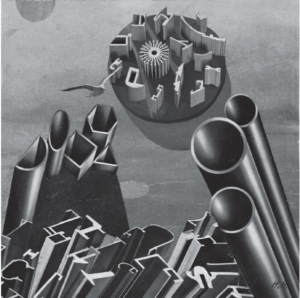
“Avant-Gardes @ Zero Hour:
Destruction, Displacement, Emergence”
CALL FOR PAPERS/MULTI-SESSION PROPOSAL
SUBMIT BY MARCH 15, 12:00 P.M. CET
“Avant-Garde and War”
9th Conference of the European Network for
Avant-Garde and Modernism Studies (EAM)
Jagiellonian University, Kraków, Poland
September 17–19, 2024 / pdf here
For the ninth biennial conference of EAM, at a moment of global crisis due to wars in Ukraine, the Middle East, and elsewhere, this session (or double session) proposes to rethink the avant-garde itself as primary site of critical inquiry into and historical register of the destruction, displacement, negativity, and emergent horizons of the global catastrophe that was the Second World War—whose long-term effects we continue to witness today. In rethinking the “origins” of the avant-garde, and regrounding avant-garde studies, after 1945—rather than earlier epochal chasms of the Paris Commune or World War I—this proposal locates the avant-garde in proximity to the meta-concept of “Zero Hour” as it was experienced not only on 8/9 May 1945 in the fall of Berlin but differentially across Europe, America, and the globe. A 2015 exhibition at the German Historical Museum, “1945—Defeat / Liberation / New Beginning,” pluralized this “moment” across the specific histories of twelve European countries. This proposal seeks to chart the emergence of numerous avant-garde movements at these “moments”—from emigration or exile; after the experiences of the camps, forced labor, Displaced Persons, or demobilization; looking forward to civilian life, reintegration, and repair; but also with profound changes to national and minority cultures and boundaries. How did these multiple moments inscribe themselves in the “cultural work” of the avant-garde? Such “cultural work” may be seen in terms of reparation or redemption—for instance, in the reemergence of avant-garde artists after fascism or the proliferation of avant-garde art forms to the “bare life” of the camps—or they may continue the bodily injury, material dispossession, or even nihilism of experiences of destruction and displacement. Aligning the emergence and continuity of the avant-garde with intellectual history and philosophy, from existentialism to Critical Theory, suggests the high stakes of attending to avant-garde movements, formal innovations, and social/cultural interventions after the Zero Hour of an “end” that is not one.
Notes and links
Send inquiries, ideas, and paper proposals to barrett.watten@gmail.com by Friday, March 15, 12:00 p.m. CET (6:00 p.m. EST).
Image: Hannah Höch, Friedenstaube (Dove of Peace; 1945). Black and white reproduction from Barrett Watten, “Modernity @ Zero Hour: Three Women (Lee Miller, Hannah Höch, Anonyma),” in special feature on “Modernity @ Zero Hour: The Question of the Universal and the Origins of the Global Order,” ed. Watten, Journal of Foreign Languages and Cultures (Hunan Normal University, Changsha, China) 4, no. 1 (June): 40–64: here.












